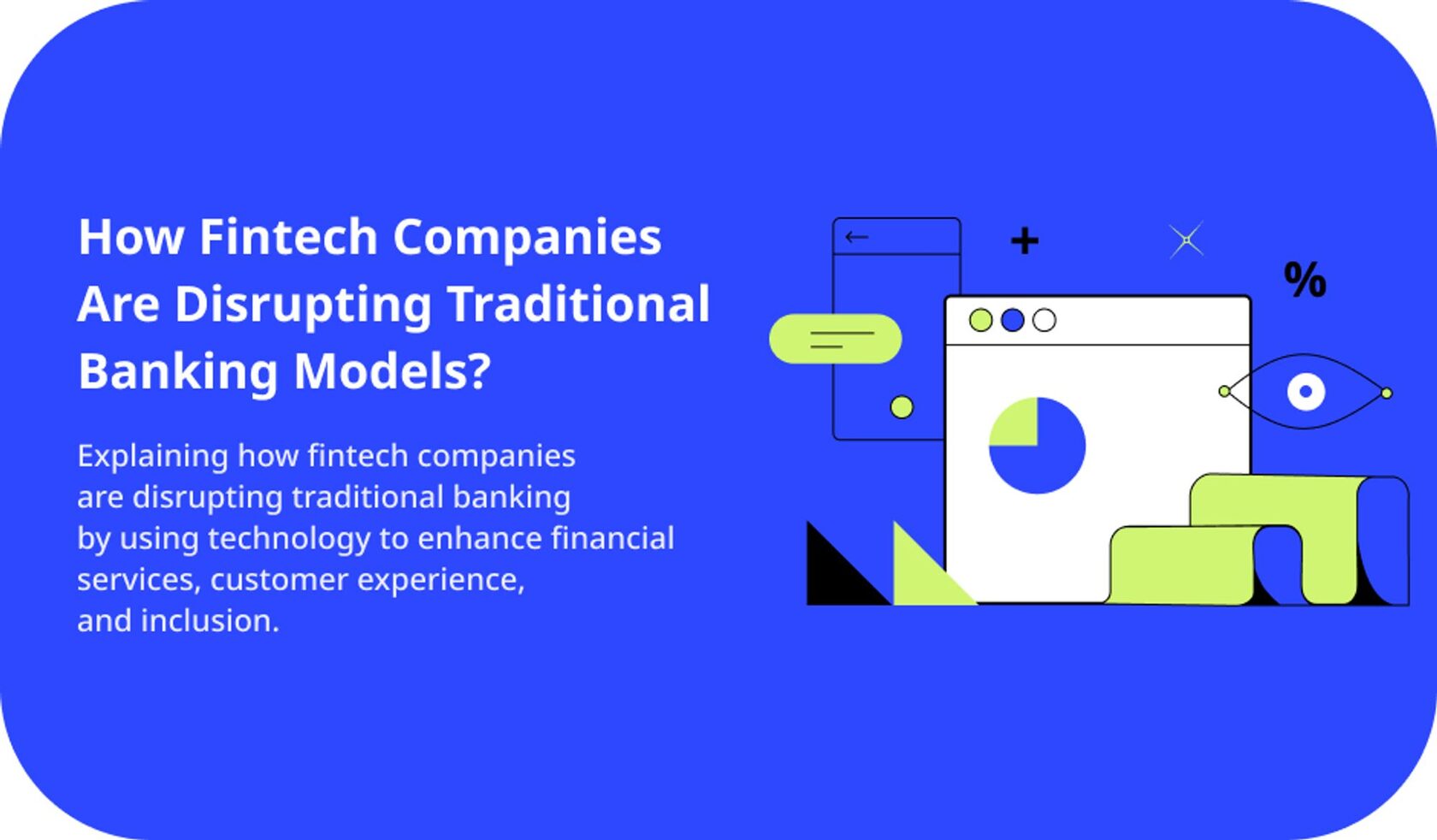
Fintech, short for financial technology, refers to companies that use technology to deliver financial services. These services can range from mobile banking and online payments to peer-to-peer lending and robo-advisors.
Traditional banking models, on the other hand, rely on brick-and-mortar branches, physical paperwork, and a hierarchical decision-making structure. These banks often have high fees and limited service hours.
Fintech companies are revolutionizing the financial landscape by offering innovative and user-friendly solutions that are challenging the status quo of traditional banking. This article will explore the key ways fintech companies are disrupting the industry and how they are making financial services more accessible and affordable for everyone.
The Traditional Banking Era
The way we used to handle our money, traditional banking, relied on physical locations and established routines. Think of it like this:
The heart of traditional banking was the bank branch itself. Need to deposit a check? Get cash? Talk to someone about your finances? You had to go in person, which meant limited hours and sometimes long lines.
Traditional banks often use older computer systems built up over a long time. These "old-school" systems can be slow and clunky, making it hard for banks to keep up with the latest technology.
Sending money through the mail or using a checkbook were the standard ways to pay for things. These methods are slow, inconvenient, and prone to mistakes. We at BMP Global help our clients to obtain a license under which you can run your own digital bank. With the help of the software we provide, our clients get a ready digital bank to run. While traditional banking might seem familiar and reliable, it has some drawbacks:
- Slow and Tedious: Lots of paperwork, manual processes, and relying on physical branches can make banking a slow and frustrating experience.
- Fees: Traditional banks often charge a variety of fees for things like keeping your account open, using your debit card, or making transfers. These fees can really add up!
- Not for Everyone: Not everyone lives close to a bank branch, especially in rural areas. Traditional bank hours can also be inconvenient for people with busy schedules.
The Rise of Fintech
The rise of fintech, or financial technology, companies has been a transformative force in the banking industry. These companies have emerged rapidly, leveraging advanced technologies to offer innovative financial services that challenge traditional banking models.
Fintech companies have significantly impacted the banking sector by introducing new ways to deliver financial services. They have disrupted the traditional banking practices by:
· Utilizing data analytics to provide personalized services and improve customer experiences.
· Increasing competition, which has pressured traditional banks to innovate and adopt new technologies.
Fintech companies employing technology in several key ways to offer these innovative solutions:
· Mobile technology has allowed fintechs to deliver services directly to consumers’ smartphones, enabling greater accessibility and convenience.
· Blockchain and cryptocurrencies are being used to create secure, transparent, and efficient transaction systems.
· Artificial intelligence and machine learning are employed to automate processes, detect fraud, and offer financial advice.
· Cloud computing provides scalable infrastructure that supports the rapid growth and agile operations of fintech firms.
Key Innovations in Banking
Fintech companies aren't just changing the game, they're offering a whole new suite of tools to manage your money. Forget about traveling to a branch – digital-only banks and powerful mobile banking apps let you manage your finances from anywhere, anytime. Whether you're checking your balance, transferring money, or even paying bills, it can all be done with a few taps on your phone.
Fintech is also making payments easier
Mobile wallets store your credit cards securely on your phone for contactless payments, and peer-to-peer payment apps allow you to send money to friends instantly and often with lower fees than traditional bank transfers.
Personal finance apps and budgeting tools from fintech companies can help you track your income and expenses, set savings goals, and stay on top of your finances more easily than ever. Finally, fintech is opening up access to credit for more people. Alternative lending platforms and peer-to-peer lending networks connect borrowers with lenders directly, offering more flexible options and potentially lower interest rates. This means even those who might not qualify for a traditional loan can find the financial resources they need.
Enhanced Customer Experience
Fintech companies are at the forefront of the financial industry's transformation, with a strong commitment to enhancing customer experience. They achieve this through the development of user-friendly interfaces that simplify the process of navigating financial services. These interfaces are designed with the customer in mind, ensuring ease of use and accessibility.
Personalization is another cornerstone of fintech's customer-centric approach. Utilizing advanced data analytics, fintech firms are able to deliver services that are tailored to the unique preferences and requirements of each user. This level of personalization fosters a deeper connection between the customer and the company.
Moreover, fintechs understand the importance of support and availability, offering 24/7 customer service across various channels to address the needs of their users promptly. The adoption of digital-first strategies further underscores their commitment to customer satisfaction.
Accessibility and Financial Inclusion
Fintech companies are main component in driving financial inclusion, particularly in developing and emerging markets. They address various challenges that hinder access to financial services, such as illiteracy, poor infrastructure, and lack of traditional banking facilities.
Digital banking solutions and mobile money platforms have significantly increased access to financial services for unbanked and underbanked individuals.
In regions like Africa, where traditional banking networks are sparse, mobile banking has become a primary means of financial transactions. Services like M-Pesa in Kenya and OPay in Nigeria have expanded across the continent, providing millions with access to banking services without the need for a physical bank branch.
Challenges and Opportunities
Fintech companies are indeed reshaping the financial landscape, offering innovative services that challenge traditional banking models. Here are some of the challenges and opportunities in this dynamic sector:
- Regulatory Hurdles: Fintech companies often face complex regulatory environments that can hinder their ability to operate and scale. Navigating these regulations requires significant resources and expertise.
- Cybersecurity Risks: As fintechs handle sensitive financial data, they are prime targets for cyberattacks. Ensuring robust cybersecurity measures is critical but also costly and complex.
- Trust Issues: Building trust with consumers who are accustomed to traditional banking services is a significant challenge. Fintech companies must prove their reliability and security to gain customer confidence
Regulatory Considerations
The regulatory landscape for fintech companies is multifaceted and evolving, as these entities navigate a complex web of compliance requirements that vary by jurisdiction. Fintechs must adhere to regulations concerning data privacy, consumer protection, anti-money laundering (AML), and cybersecurity, among others.
Regulatory frameworks ensure consumer protection and financial stability, they can also pose challenges for new entrants due to the cost and complexity of compliance. However, regulators are increasingly recognizing the need to balance oversight with fostering innovation, leading to initiatives like regulatory sandboxes which allow fintechs to test new products in a controlled environment.
How we see the Future of Fintech Companies?
The future of banking and fintech is poised for substantial growth, driven by rising trends and technological developments such as artificial intelligence (AI), blockchain, cloud computing, and digital banking. These technologies are expected to further disrupt traditional banking models, offering more personalized services, enhanced security, and greater efficiency.
Fintech’s role in shaping the future of finance is significant, with the potential to increase financial inclusion, democratize access to financial services, and create more user-centric products. The industry’s development suggests a shift towards a more integrated financial ecosystem where fintechs and traditional banks collaborate, develope each other’s strengths to meet the modern needs of consumers.
Conclusion
Fintech is changing the way we bank, making it easier and faster to handle money. We, at BMP Global are consulting our clients from around the world, if you want to know how to optimise your business processes, get a free consultation.













